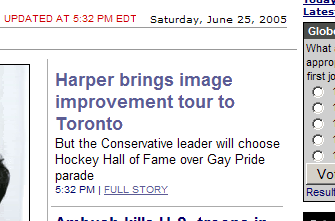Newspaper headlines and the power to influence
Stephen Harper visits Toronto to help launch the International Dragon Boat Festival, and judging from these headlines, these three major new media outlets all take a different view on the events.
Sun Media: "Harper comes to T.O.: Embattled Conservative Leader Stephen Harper took a break from parliamentary follies to open Toronto's International Dragon Boat Race Festival."

CTV Online: "Harper still fuming about budget vote outcome: Embattled Conservative Leader Stephen Harper took a break from parliamentary follies to open Toronto's International Dragon Boat Race Festival."

Globe and Mail: "Harper brings image improvement tour to Toronto: But the Conservative leader will choose Hockey Hall of Fame over Gay Pride parade"

Looking at the headlines, I'd expect the Sun to be providing not much more than a blow-by-blow of Stephen Harper's weekend, with a bit of a review of the previous week in Parliament. CTV's article will play up the emotional fallout from the budget vote. And from the Globe and Mail, a discussion of how the Conservatives are avoiding gay community events, suggesting a limit to how far the "image makeover" will go.
That's what I'd expect. And I'd be wrong.
In fact, all three stories are exactly the same, word for word, provided by Megan Thomas of the Canadian Press news service. The article itself talks about the the budget vote, Stephen Harper's "makeover", his warm reception at Centre Island, Jack Layton's presence and how he impressed the Chinese community with some some words in Cantonese, and some political jibes from both aimed at each other or at the Liberals, as appropriate to their position on issues.
What about the gay angle played up by the Globe and Mail headline? The whole thing is dismissed in the very last sentence of the article. This article says only that Stephen Harper will be spending time with his nine-year-old son instead of going to the parade. It makes no mention of the political optics of attending the parade filled with political opponents (though those optics are almost certainly at play) and leaves the impression that the parade is merely not a suitable place to be if you are spending time with a nine-year-old (which is a fair statement).
So what's the point of playing these games with headlines? Whatever fleeting impression is provided by the headline is going to be replaced once you read the article.
An Online Publishers Association study in September of 2004 showed that newspapers are the first choice of a media source for 3.2% of the population, and second choice for another 6%. These are dismal numbers (television came in at 35% and 28%, and the Internet at 46% and 32%). Moreover, 95% of people spent less than two hours a week reading newspapers.
This suggests that few people exposed to newspapers actually spend time reading the articles -- at less than 2 hours a week, there simply isn't enough time to read more than a couple of articles in detail. This might seem like a disappointment to journalists, but it is a huge opportunity for headline writers. Knowing as they do that few people will actually read the article, they can, if they so chose to, transmit a message via the headlines, since most readers are just glancing at the pages.
Does the CP article reprinted in the Globe and Mail actually discuss Stephen Harper's "choice" between going the Hockey Hall of Fame and the Gay Pride Parade? Only briefly. Does it touch on the politics of that choice? Not at all. But that's OK. Statistically speaking, no one is going to read the article anyway. Contruct a headline that infers that this choice is really a snub aimed at the homosexual community, and most people will fold the newspaper after perusing it for 5 minutes with the impression that such a snub had been delivered.
More subtle than "Stephen Harper hates gays", but probably as effective, especially for readers who might already be inclined to believe that.
Mission accomplished.
